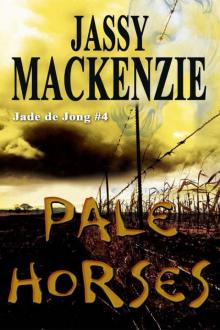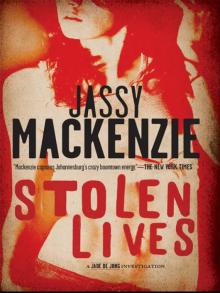- Home
- Jassy Mackenzie
Folly
Folly Read online
For my best friends and poker buddies Camilla, Garry, Nicky, Sean, Jenny, J, Moira, Phil, and Bouille
Chapter 1
The white Toyota Camry was waiting outside the gate when I arrived home on a sweltering afternoon in late January. It was the third day of the heat wave that had sent temperatures rocketing into the thirties all over Gauteng, withering gardens and melting tarmac and sparking dire warnings from the Water Board about the unseasonably low levels of water in the Vaal Dam.
The driver’s window was wound all the way down so I could see the car had only one occupant – a slender Indian man. As soon as he saw my Renault turn down the long, sand panhandle he scrambled out, brushed at his trousers as if removing evidence of crumbs, and pushed a pair of dark glasses up onto his head.
So inoffensive-looking was he, that, despite the fact that this was a city where strangers were almost always treated with suspicion, I nursed my car over the drainage hump in the driveway, opened my door (the electric windows had stopped working in November), leaned out and asked if I could help.
To be honest, I’d thought he was probably lost. I live in a semi-rural area where signposted road names are more the exception than the rule, and by some strange law of physics, or perhaps the suburban tidal system, a lot of the drivers who do get lost end up making their way down Bottlebrush Avenue, where I live.
He reached back into his car and pulled out a blue cardboard folder and then walked over to me. It was his demeanour more than anything else, plus the fact he was carrying that official-looking folder, that made me realise – with a surprising thrill of fear – that his presence signalled bad news.
‘Mrs Caine?’
His voice was polite and respectful, but it was the use of my name that made my stomach clench.
‘Yes, that’s me,’ I said. Abruptly, the peanut-butter sandwich I’d had for lunch turned into acid and began eating away at my innards. A trickle of sweat inched its way between my breasts, which were crammed into a bra that had been the right size a year ago. Suddenly, my vehicle felt claustrophobic. So did my life, actually, but at least I could get out of the car.
‘Excuse me,’ I said. I opened the car door all the way and wriggled my bare feet back into the pair of smart but hellishly uncomfortable court shoes I’d worn to the meeting with the employment agency and kicked off on the way home to make driving easier. He moved aside politely as I climbed out and stumbled over to the spindly bushwillow tree we’d planted a few years ago and which had never really thrived. Then he followed me into its insubstantial shade.
‘My name is Mr Ramsamy, and I am employed by the City Bank Home Loans division,’ he informed me. ‘I’m sorry to trouble you at your residence, but I am here to deliver a letter of final demand. I have been trying to get hold of you on the phone but neither of your numbers appears to be in service.’
He was right – they weren’t. My business number wasn’t working because the company who’d employed me had been liquidated four months ago, and my cellphone wasn’t operational because it had been cut off just last week due to non-payment. I’d fought valiantly to try to save it. A phone was something I had dreaded being without, but it had been one of the final victims of the landslide of debt that had started way back at the beginning of last year and had reached terminal velocity in December, when, in a thunder of rocks and boulders, the cliffside of my finances had collapsed.
It would be wrong to say I hadn’t expected someone like Mr Ramsamy to turn up at my gate at some point. Of course I had. I’d spent sleepless nights wondering when the worst would happen, although I had envisioned something more dramatic. A platoon of lawyers, possibly accompanied by a cohort of tough-looking debt-collector types, who would invade the property en masse and, with warrant and subpoena in hand, literally capture the territory.
Even so, I was discovering that the reality of Mr Ramsamy’s slim and unassuming presence was far worse than any of my imaginings had been. Final demand … Home Loans division … and he had brought the documents to my gate. The rusty, wrought-iron gate leading into the palisaded four acres of land that was everything I owned.
I stared at him helplessly, panic boiling inside me, the clamour of my frenzied thoughts making speech impossible. The feeling was similar to what I’d experienced this time last year when the paramedics had called me to tell me that my husband had been rushed to ICU after being involved in a serious road accident. A dizzying sensation, an overall breathlessness, as if all the oxygen had been sucked out of the air.
‘I’m very sorry to inform you that the bond repayments on your home are now seriously in arrears … no response to the bank’s phone calls … registered mail not collected … need to get the repossession process underway …’ I stared at him without really seeing him at all as he recited so pragmatically the chain of events that had brought him here.
‘You should have received this letter at the end of December, but we’ve been experiencing delays due to our backlog,’ he continued. ‘So, because of the backlog, the bank needs to action this as a matter of urgency. When would it be convenient for you to come into the branch?’
The fact that there were high numbers of other home-owners in the same predicament as me gave me no comfort at all. Despite the harshness of what he was saying, his voice was gentle. I supposed the backlog had given him a chance to develop something of a bedside manner, which I suspected was designed to defuse violence. Even so, for one crazed moment I felt like grabbing him by his shrimplike shoulders and shaking him until his teeth rattled, just to try to stop the flow of those awful words.
‘What can I do?’ I blurted out. ‘Is there anything I can do to save my home?’
Mr Ramsamy gave a small frown.
‘Well, if you were to pay the arrears in full, you would be able to avoid having the property repossessed.’
Dear God, by now the bond payments must be more than six months in arrears. There was no way … no way.
‘What if I could make a part payment?’
Now his frown deepened.
‘You’d need to discuss that with the Home Loans department.’
‘If I don’t pay, how soon will I be evicted?’
‘It would probably take around four months for the judgment to be handed down and the property attached by the bank. After which it would be resold.’
‘But how would the bank sell it when the property market’s not moving?’
‘Most repossessed properties go to auction. The plots often get sold on spec to a developer. They’re always looking to buy up land cheaply, especially out here in the more rural areas, what with the subdivision laws up for review in the next few years.’
My dear, tranquil plot of land going under the hammer, bought by somebody who would bulldoze the house and the stables, uproot the trees and ravage the grass, only to build a block of thirty concrete-paved cluster homes in their place. The idea filled me with horror.
‘I’ll make a plan,’ I gasped. ‘I’ll do my best to get the payments up to date as soon as possible. Please, just give me this last chance.’ I found myself blinking tears from my eyes and I suppressed my sobs with an effort, worried that if I allowed myself to start crying I simply wouldn’t be able to stop.
‘I’m sorry, but it’s not my decision, Mrs Caine. You’ll need to speak to the Home Loans department, and you must do so within the next fortnight. Your failure to communicate with the bank has created a serious problem. In the meantime, you need to sign here, please, to acknowledge receipt of this letter.’ He handed me a pen and I scribbled a vague approximation of my signature on the lines he indicated.
‘Contact the bank as soon as you can,’ he urged, shuffling the paper back into the folder.
‘Thank you for your time and …’ He paused, staring at me. Sudde
nly, I saw myself through his eyes. A slightly overweight, tearful woman with a strip of regrowth along the roots of her dyed hair, standing between the driver’s door of a battered Renault that looked as if it might have done service in Beirut, and the rusting front gate of a property whose bond payments were now critically behind.
Oh god, I’m pathetic.
Was this what I had become? And why had I been unable to prevent it?
‘I hope you can sort something out. I’m truly sorry for your predicament.’ He finished in a more gentle voice before climbing into his immaculate Camry and reversing carefully down the driveway.
Now blinded by free-flowing tears, I somehow managed to drive through the front entrance without scraping either the gate or the car. I barged my way into the house, not even pausing to greet the four cats, who had artfully arranged themselves in the sparsely furnished living area.
I stumbled upstairs and collapsed into the tatty office chair in front of my computer. With my hands shaking so badly I kept pressing the wrong keys, I connected to the non-password-protected wireless Internet that belonged to one of the neighbours and waited for my banking site to upload, to see if, by some miracle, any money had materialised in my account.
While I was logging on, two new email messages downloaded to my inbox. Both were ‘Thank you for submitting your cv; we regret to say …’rejection letters for the last two jobs I’d applied for.
I’d been hopeful about both, but I hadn’t even cracked the nod for an interview.
And my account was just as overdrawn as yesterday. No miracles. Not surprising, really, considering the number of times I’d taken the Lord’s name in vain over the past few months. In fact, truth be told, I was probably right at the top of the smiting list.
I sat there, staring blankly at the minus signs. The only thought that had any clarity to it was how smug my hateful older brother Roger would feel when he heard the bank had foreclosed. The younger sister who he’d always predicted would never make good, now finally proving him right.
Unless … unless … there might still be some way I hadn’t thought of, a way I could prove him wrong.
Chapter 2
The following morning, armed with a notebook and pen and a strong cup of coffee, I sat down at the plastic dining-room table. Here, I planned to take cold, hard stock of my financial situation before putting together a workable plan to redeem myself. I’d applied for twenty-two jobs since my retrenchment. Of my applications, fifteen had been rejected and the remaining seven simply ignored. It wasn’t that I was a bad copywriter, it was simply that right now, in the recession, advertising agencies were cutting back. Which meant they weren’t hiring. More specifically, they weren’t hiring people who’d spent twelve years working for the same small, run-of-the-mill company and had no relevant degree.
‘It would be easier to place you if you had some proper qualifications,’ one of the recruitment consultants had bemoaned.
‘Doesn’t experience count?’ I’d asked her. ‘I mean – what difference does a three-year degree make when I’ve been working in the industry for four times that?’
She’d shaken her head regretfully. ‘It makes a lot of difference. In this economic climate, employers want to be sure they’re hiring the right person. Which reminds me, I wanted to ask you about this period of time on your cv, back here after you’d finished school, where you have no work experience listed. Were you really travelling abroad for that long?’
‘Of course I was,’ I said, with some haste. Then, more defensively, ‘Look, that was nearly twenty years ago. Nearly twenty years! Is any HR manager going to be interested in looking so far back? It’s not like I’m applying for a job with the FBI. You can’t expect me to account for every minute of that time.’
Her frosty silence had confirmed that yes, she could. The interview ended a few minutes later.
So there it was. A misspent youth, and look where it had landed me. I was both unqualified and unemployable.
At this point, with the piece of paper in front of me still blank, my budget calculations were interrupted by a persistent tapping on the kitchen door.
It was Goodness, the gardener and groom who’d worked for me for more than a decade, who lived with his family in the humble, threeroomed ‘flat’ that backed onto the stables, and whose main job was to care for my two now-retired horses and to try to prevent our four acres of land from turning into the Serengeti.
He informed me, in polite and sorrowful tones, that we were down to the last two bales of hay.
Through the open door I could hear the faraway drone of rush-hour traffic from the main road leading to the Sandton CBD, and the closer, more aggressive revving of engines from the rat-runners who used the country lanes as a shortcut. Lucky them, I thought. Lucky them, going to work.
‘Thanks for reminding me. I’ll organise another delivery as soon as possible,’ I said, making sure to smile.
My calm tone was entirely at odds with the sick, churning fear I felt as I looked out of the kitchen window at the pair of thoroughbreds, who were not, for once, steadily munching their way through obscene quantities of expensive fodder. Ace, the older of the two, was dozing in the sunshine in the bottom left-hand corner of the fenced-off field that was their home. Admiral was standing by the gate, ears pricked, observing one of my cats on the prowl.
I turned back to the open-plan living area. There wasn’t much furniture left in it. A dark wooden sideboard, now empty. One rather scuffed brown couch and an ancient armchair. Wooden bookshelves lined the south wall which, six months ago, had had a lot more books in them. The top shelf had been reserved for the ornaments that my husband Mark had given me over the years, which were mostly of cats, and which had come to be something of a tradition for birthday presents.
The Lladro pieces and the Wachtmeisters were all gone now. Only a few of the cheaper ones remained, staring down at me, their expressions simultaneously managing to convey disapproval at these reduced circumstances, and offence that they had not been considered valuable enough to sell.
I caught myself muttering under my breath. Muttering and counting on my fingers, just like a crazy cat lady might do.
‘Ten bales of lucerne, ten of hay. I wonder if I can persuade the supplier to let me pay at the end of the month.’ A ridiculously optimistic idea, I knew. ‘Plus Goodness’s salary, groceries, food, soap, petrol, candles.’
I was ticking the items that I had a hope of paying for – those that would allow me to live from day to day. Trying desperately not to think about the other massive, frightening sums.
The outstanding bond payments, first and foremost. The rates and taxes. The water. The electricity bill – as a result of late payment, the power had been cut off for more than a week last month, and the month before – hence the need for the candles.
A hoot from outside the gate jerked me away from my unhappy calculations. It seemed that 14 Bottlebrush Avenue was quite the destination for uninvited visitors these days. Wondering which financial institution the new arrival would represent, I dragged myself tiredly to the window and looked out.
Parked at the gate was the gleaming grey Mercedes that belonged to Randy Da Silva, my lawyer.
Well, not exactly my lawyer. My brother’s long-standing lawyer friend, who he’d hired on my behalf when he’d flown up to Johannesburg this time last year, after Mark’s accident, to do what he called in his own words, ‘sort me out’.
I trudged over to the front door, took the remote control for the gate off the hook and pressed the button to open it. At the same time, I glanced into the hall mirror. The woman who stared back had a frightened face and tired, sallow skin. She looked ten years too old and ten kilos too heavy.
On the small table in the hallway stood a framed photo of myself and Mark, taken outside the Moulin Rouge in Paris, on our honeymoon several years ago. We stood arm in arm. Clad in a pair of figure-hugging black pants and a scoop-necked top, I looked curvaceous and beautiful. I was aglow with happ
iness, expensive cosmetics, and the after-effects of two glasses of Chardonnay. My hazel eyes were sparkling and my dark, shiny hair was ever so slightly mussed, possibly from the passionate quickie we’d had in our shoebox-sized hotel room just an hour earlier.
I’d instigated it while we were getting dressed to go out. Playfully, I’d grabbed Mark’s shoulders and pushed him down onto his back on the squeaky double bed with his pants not yet buttoned and surprise in his eyes.
Then, after we’d hastily fumbled off my own underwear, I’d straddled him. I had taken hold of his wrists and pushed his arms down onto the pillow behind his head. I’d wrapped my fingers around them, pinning him in place, letting him know that, this time, it was going to be my sex, my way.
Both of us were giggling and breathing hard, whispering at each other to be quiet thanks to the hotel’s paper-thin walls through which we’d realised sound penetrated all too easily. We had already heard the monsieur in the room next door clearing his throat on several occasions and, once, letting out a trumpeting noise which Mark had identified as ‘un grand fart’.
Now, the photo mocked me and so did the memories of that happy time before the money problems and the fights had started. Angrily, I turned the frame to face the wall and stepped out into the bright and sunny morning.
Da Silva slammed his car door, lifted his briefcase out of the boot, and walked across the bare soil of the front-garden-to-be, pausing to wipe his feet rather ostentatiously before entering the house.
‘Ah, Emma. Glad to find you at home,’ he said with his trademark faux warmth, and I saw him give a swift sideways glance into the hallway mirror as if to reassure himself that his silvery-grey hair and his well-pressed suit and his shiny gold tie were all still just so. ‘I’ve been unsuccessful in getting hold of you on the phone so I thought I’d pop by.’
‘I’m sorry.’ I closed the front door behind him, my mind racing as I tried to come up with a plausible excuse for being incommunicado. ‘My phone’s been working on and off over the past few days. Faulty cellphone tower in our area, apparently.’

 Pale Horses
Pale Horses Bad Seeds
Bad Seeds Random Violence
Random Violence Folly
Folly Stolen Lives
Stolen Lives The Fallen
The Fallen Soaring
Soaring Drowning
Drowning